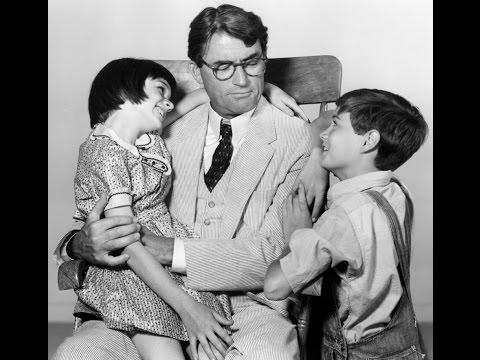Spoilers will be present in this article, as “To Kill A Mockingbird” has been out for over fifty years and the article’s point of speaking to how it’s an ageless wonder necessitates spoilers.
To Kill A Mockingbird, by Harper Lee, is one of the most important books ever written. Coming in as my second-favorite book of all-time (just behind Stephen King’s IT), I will always appreciate my first exposure to it in ninth grade English class with Mrs. Burnett. It is largely told through the eyes of Scout Finch, an inquisitive six-year-old Caucasian who lives with her father, Atticus, and her older brother, Jem, in Alabama during the 1930s. As Atticus, a lawyer, takes a case defending Tom Robinson, an African American, of an unwarranted charge of rape against a white woman, the ugliness of prejudice and racism is at the forefront, and Scout and Jem learn of its prevalence in American society. For all those book-haters out there, a movie of the same name, starring Gregory Peck as Atticus, also exists. The film version won three Oscars, including Best Actor in a Leading Role for Peck. Like the book it is based on, the film is one of the best, most culturally relevant American films ever produced.
I am not alone in holding the opinion that To Kill A Mockingbird is one of the best stories in American history. In fact, most scholars and critics cite the Harper Lee-originated story as one of the United States’ best. My question, however, is what is present in To Kill A Mockingbird – both the book and the film – that makes it such an ageless, excellent, culturally relevant story? Why should it be required reading for all American children?
I’ve come up with a few reasons why the story’s impact and depth is, quite simply, unmatchable.
1. It Is Daring and Brave
Take a minute to think about the time period in which this story was first published. Harper Lee’s incredible story was published in 1960, right in the middle of the Civil Rights Movement. After the book’s immense popularity, the movie was released in 1963, just three years later.
Given the time period, Harper Lee’s book is one of the most daring ever released. Coming at a time when African Americans were still believed to be inferior to Caucasians by more than a few white Americans, TKAM‘s plot of Atticus, a well-respected, much-loved white man, defending Tom, an African American, from an inaccurate charge of raping a white woman was sure to ruffle a few feathers. Lee, however, chose to move forward with the progressive book, and created a masterpiece that should be read by all in the process.
Lee didn’t allow the nature of America in the mid-1900s to change how she wrote TKAM, or what she wrote about. Furthermore, the movie adaptation, unlike many films based on books, follows the book’s events to a very large degree, refraining from taking out any potentially controversial racial aspects. Instead, it gets a huge movie star, Peck, to play Atticus, and gives him one of the best speeches in movie history to boot (a closing speech that, due to Peck’s brilliance, took just one take to complete, according to imdb.com). The filmmakers, actors, and producers are clearly in agreement with Lee that TKAM is an important story to tell, even with the social unrest and divided nature of much of the country during the time period of its release. This makes for an extremely daring and brave novel in 1960 – and film in 1963 – and can serve as a way for schoolchildren to see that one person’s idea, no matter if it’s against the grains or not, can aid in sparking a conversation that ultimately leads to a major cultural change.
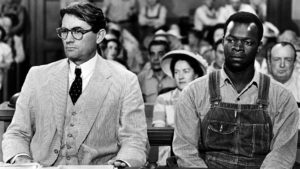
2. Tom Robinson’s Fate
Harper Lee pens the most heartbreaking ending to Robinson’s story as possible, as he is found guilty of a crime that he simply didn’t commit due to the jury’s bias against African Americans, and their unwillingness to believe that Robinson may, in fact, actually be a kindhearted black man who simply wanted to help a white woman. Instead, they believe the clear lie that Robinson raped the woman, Mayella Ewell, because they are unwilling to open their minds to the possibility of their long-held viewpoints being inaccurate and bigoted. Robinson is then tragically killed as he tries to escape from the prison where he is wrongfully being held. He is shot 17 times in the back, as the prison guards leave no chance of Robinson surviving, shooting him many, many more times than necessary.
Despite TKAM taking place in the 1930s South, this tragic ending has to sound at least a little bit familiar to people of the present day. In an effort to remain as least political as possible, I won’t expand too much on this point, but the tragic endings to victims such as Trayvon Martin, Michael Brown, and Eric Garner (among countless others) mirror Robinson’s, as does the fact that 1 in every 15 African American men will be incarcerated at some point in their lives, compared to just 1 in every 106 white men. I could elaborate on this for paragraphs upon paragraphs, but the real point I’m trying to make is Robinson’s story – and, by extension, TKAM as a whole – is one that is largely relevant today, and the tragic ending to his story is one that new generations of children should be exposed to, in an effort to lessen the amount of these occurrences in real life moving forward. It is important for readers and viewers (mainly children) to see that society doesn’t treat everyone equally; society marginalizes certain people, and empowers others. Most importantly, new readers (and viewers) will see that this is something that needs to change, even (or, rather, especially) now. Through Atticus, Tom, Scout, and Jem (among a few others), TKAM effectively shows that these horrible realities of society need to be rectified, and that simply by loving others regardless of age, race, ethnicity, sexual orientation, etc., the world could be a much, much better place for all.
3. It’s Childlike Viewpoint
The fact that TKAM is shown largely through the eyes of Scout makes it all the more relatable. As a six-year-old child, Scout (portrayed to perfection by the then-ten-year-old Mary Badham, who earned an Oscar nomination for Best Actress in a Supporting Role for her performance) is unable to see much of the ugliness present in the world. As a result, we are taken on a journey of innocence, and the eventual corruption of innocence as Scout begins to realize just how racist and unjust the society around her can be.
For many (myself included), telling the story largely through the eyes of Scout is a genius move by both Lee in the book, and director Robert Mulligan in the film. Despite TKAM having a mature plotline surrounding the accused rape of Mayella, Scout’s innocence and wide-eyed nature makes the film humorous at many points, and allows the reader/viewer, especially is (s)he is a minor, to connect with the loveliness of youth and innocence. Then, as the story progresses, Scout is slowly exposed to some of the most vile parts of society, and that feeling of innocence is lost, much to the heartbreak of the reader/viewer.
The fact that TKAM is largely told through the perspective of Scout, a very young girl, greatly aids in the ageless excellence of the story.
4. It Has Many Relevant Quotes
Here are just a few of the quotations that are most relevant and thought-provoking to me. Those reading/watching TKAM are witnesses to some of the most inspiring, important, culturally relevant quotes in American history, and it should be both required reading and viewing for all.
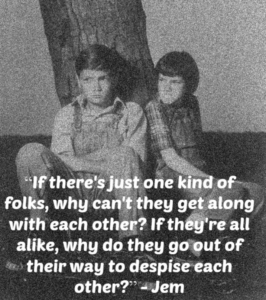
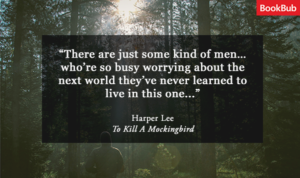
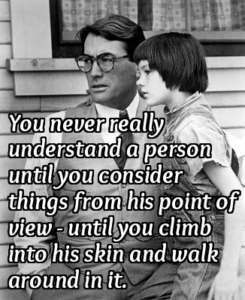
Wrap-Up
To Kill A Mockingbird is one of the most culturally relevant, important stories ever told in an American platform. Harper Lee has created a world that will forever be quoted, forever beloved, and forever important from a societal perspective. Put simply, To Kill A Mockingbird is an ageless wonder that should be read by all.


